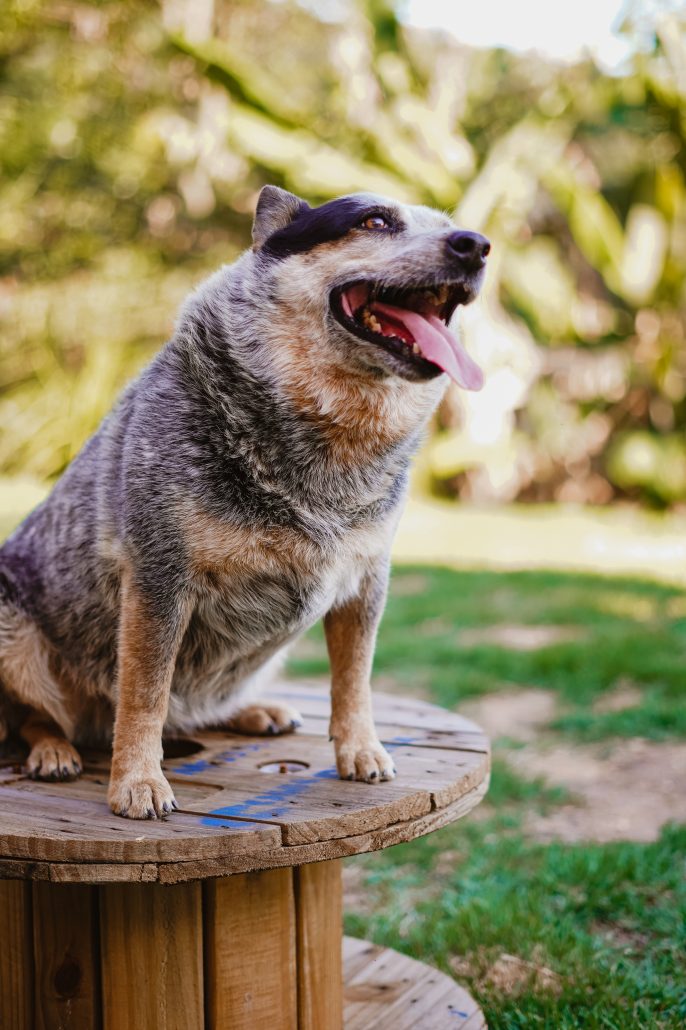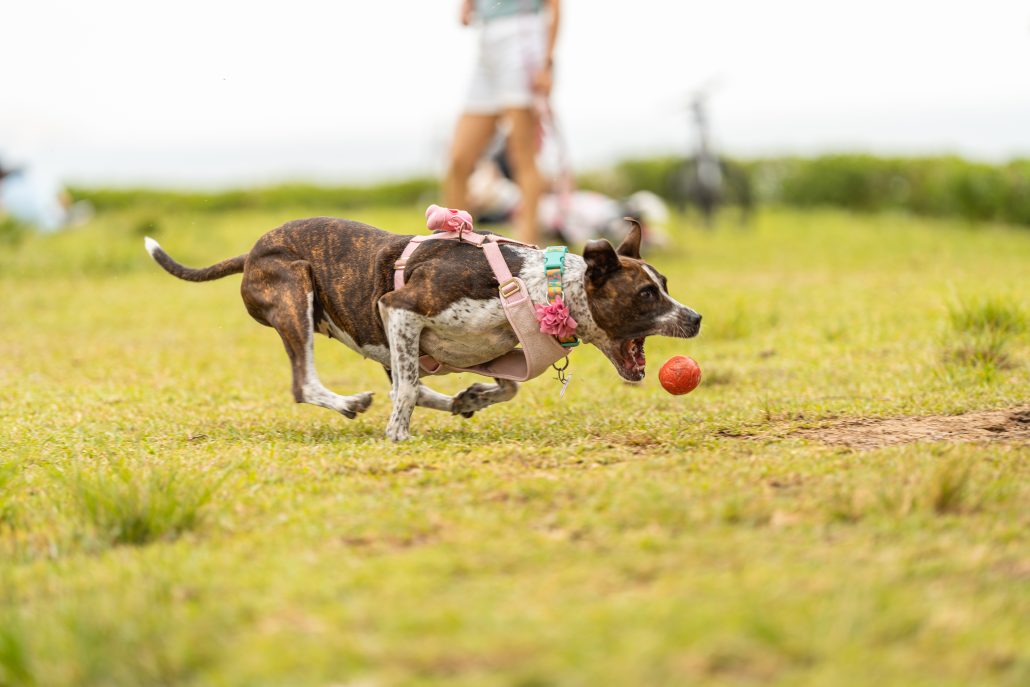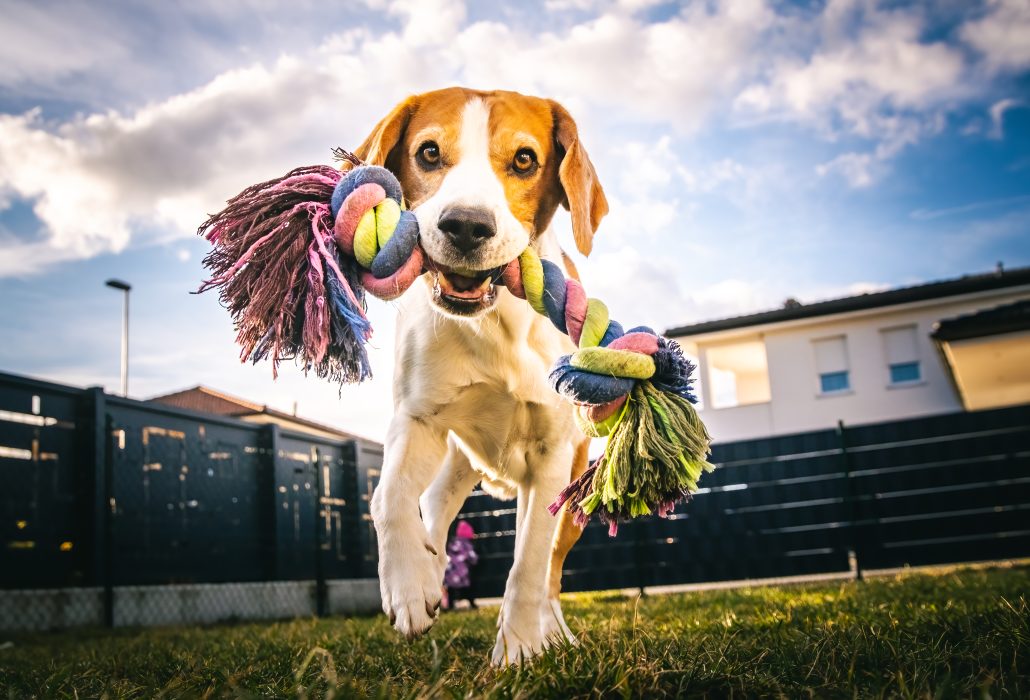
We’ve seen it before – front legs stretched forward, rear end in the air, and a tail wagging so fast they just might lift off! Whether it is a game of fetch in the park or a tug-of-war session in the living room, nothing brings a smile to our faces quite like watching our dogs at play!
But have you ever stopped to wonder why play is so important for dogs? While it is a great way to burn off energy, play is a vital part of their physical, emotional, and social health, too. In this post, we explore the science behind play and why it is so important for our furry friends. Plus, we also offer some practical ways to make playtime more enriching for both you and your dog.
The Science Behind Dog Play
There are many reasons our pups love to play. Put simply, it’s an instinctive behaviour that is essential for their development. Our dogs are born to play. In fact, from the moment they are able to move around on their own, puppies will initiate play with their littermates.
For wild canines, playing is a way to learn critical survival skills like body awareness, stalking, chasing, and capturing prey. It prepares them for the challenges they might face in the wild. For our domesticated dogs, however, play isn’t so much about survival. Because we care and feed for them, they don’t really need to worry about hunting for food or defending themselves in the wild.
Instead, play becomes a tool that shapes how our dogs learn, grow, and interact with the world around them. Play at an early age sets the stage for developing essential life skills, from coordination and balance to learning appropriate social behaviours with other dogs and humans.
Research shows that playtime can significantly enhance a dog’s development, particularly when it comes to learning new skills. So, when we play with our dogs after a training session, they reinforce the skills they’ve just learned and improve their ability to retain them.
Play & Behavioural Issues
Our dogs are incredibly smart, and just like us, they need mental stimulation to keep their minds sharp and their bodies happy. When a dog doesn’t have enough to do, they’re more likely to act out—chewing up furniture, digging holes in the yard, or becoming overly vocal. But don’t worry! The answer to these behavioural challenges often lies in one simple solution: play.
- Using Play to Reduce Anxiety: Just like we might reach for a comfort activity when feeling stressed, our anxious dogs can find relief through play. Simple games like scatter feeding or treat hide-and-seek create positive associations that help ease those nervous jitters. We’ve seen remarkable transformations using puzzle toys and lick mats, especially during those nail-biting moments like grooming or bath time.
- Addressing Aggression Through Structured Play: When it comes to managing aggression, play can be a powerful tool. Structured play activities work wonders in redirecting that excess energy while teaching emotional control. Those intense moments during fetch or tug games? They’re actually perfect opportunities for dogs to learn positive ways to channel their energy, especially in typically triggering situations.
- Satisfying Instinctive Desires: Even though they are pets, dogs still have strong natural instincts. By engaging in activities that tap into these instincts, like fetch or hide-and-seek, you allow your dog to satisfy their natural drives in a controlled and positive way. This not only keeps them mentally and physically engaged but also prevents them from channelling these instincts into unwanted behaviours.

The Benefits Of Play In Dogs
Engaging in regular play provides a wealth of benefits, from physical health to mental stimulation, and it strengthens the bond between you and your furry companion. Here’s how play positively impacts your dog:
Physical Benefits
Just like us, our four-legged friends need regular exercise to stay healthy and strong. Play is one of the best ways to keep your dog active and healthy. Games like fetch, tug-of-war, or even a good run in the yard help burn off excess energy, and maintain a healthy weight.
- Heart Health: Active play helps dogs maintain optimal heart health. Research shows that regular play and exercise can decrease blood pressure and reduce cholesterol levels. Our patients show remarkable improvements in chest and leg muscle strength from activities like running and swimming.
- Muscle Development: Playtime helps strengthen and tone your dog’s muscles. Whether it’s chasing after a ball, tugging on a rope, or climbing over obstacles, this type of play engages various muscle groups, promoting balance and coordination. Well-developed muscles support overall mobility, helping your dog maintain a healthy body and avoid injuries.
- Weight Management: Keeping your dog at a healthy weight is crucial for their long-term health, and play is one of the best ways to help with that. Activities like fetch, swimming, or interactive games keep your dog moving and engaged, making it easier to manage their weight and keep them fit and lean. This can also help prevent the development of obesity-related health issues, like diabetes and joint problems.
- Joint Health and Mobility: Active play helps maintain healthy joints and enhances mobility, especially as your dog ages. Play that involves running, jumping, and climbing can help keep their joints limber and strong. This is particularly important for larger breeds or senior dogs, who are prone to joint issues like arthritis. Play provides the movement and flexibility needed to keep those joints functioning smoothly and reduces related stiffness or discomfort.
Mental and Emotional Benefits
Want to see your worried friend transform into a confident companion? Regular play works wonders for our dogs’ stress levels. Just five minutes of playful interaction can trigger the release of oxytocin (the “love hormone”) and reduce cortisol levels.
This not only makes playtime enjoyable for your dog but also provides them with the emotional relief they need to feel more at ease. But, play is also good for us too! 76% of pet owners report improved health, while an impressive 87% experience mental health improvements from pet ownership. It’s a win-win!
Cognitive Stimulation
Have you ever noticed how tired your pup is after a training session? That’s because mental exercise can be just as tiring as physical play! While a run or fetch game helps burn off energy, cognitive play encourages your dog to think, analyse, and use their problem-solving skills, engaging their brain in ways that physical play alone can’t.
Brain games and puzzle toys are perfect tools for providing mental exercise, and helping your dog improve problem-solving skills, memory, and focus. Plus, you’ll often see better moods, improved behaviours, and even your dog sleeping more soundly after some good mental stimulation.
Social Benefits
We all want to raise well-adjusted, socially confident dogs, and play is a vital part of helping them get there. Through positive play interactions, your dog learns key social skills that will benefit them in all areas of life, from other dogs to humans and everything in between.
And, the earlier they start, the better! Puppies who jump into social play from 4-5 weeks old grow into dogs with excellent canine social skills and confidence.
- Building Confidence Through Play: Consistent play can also be a fantastic confidence booster for fearful or shy dogs. Low-pressure, positive play helps them build trust in their environment and in you as their owner. It provides them with a safe space to explore and practice new behaviours without fear. Over time, this can help reduce fear-based reactions and encourage more assertive, confident behaviour.
- Stronger Communication Skills: Play encourages social interactions. Whether playing with you, other dogs, or family members, dogs learn important cues about body language, vocalisations, and emotional responses which strengthens their ability to communicate with you and others.
- Learning Appropriate Social Behaviours: Just like humans, dogs need to learn how to communicate with others. Play helps your dog sharpen their ability to use body language, and vocalisations, learn when to back off or take a break,and respect boundaries and other cues that convey emotions.
- Strengthening your Bond: Dogs prefer to play with others rather than alone. So, when you make time to engage in play with your pup, you’re offering them something they naturally crave—social interaction and connection. You become more than just a caregiver and a trusted companion and playmate.

Creating the Perfect Play Environment
Yes, play is important, but you want to ensure they are safe too! Whether indoors or outdoors, ensuring your dog’s environment is both stimulating and safe can make playtime enjoyable for both of you.
- Indoor Play Space Setup: If you’re playing indoors, creating a designated space free from obstacles and fragile items allows them to move around and play freely without the risk of injury. You can use baby gates or playpens to create a secure zone where your dog can freely play and help prevent them from accessing areas where they shouldn’t be, like the kitchen or staircases.
- Outdoor Play Space: For outdoor play, a secure, fenced-in area is essential. A well-maintained, high fence keeps your dog safely contained while they burn off energy. Make sure the fence is tall enough and check for any gaps or weaknesses where your dog could squeeze through. A good outdoor play area should also have shaded spots where your dog can rest when they get too hot, especially on sunny days.
- Water Access and Hydration: Water is especially important in warmer weather. Always ensure fresh water is available during play, especially in the summer months. Play is tiring! If your dog is playing outside, consider setting up a water bowl or an automatic water dispenser, so they can stay hydrated.
- Safety First: Safety should always be a priority when setting up a play space for your dog. Regularly inspect toys for wear and tear—damaged toys can pose a choking hazard. Also, be mindful of any toxic plants or chemicals in the play area that could harm your dog. And, even in the safest environments, always supervise playtime to ensure your dog is engaging safely.
Age-Appropriate Play
Play is an essential part of a dog’s life, and it doesn’t have to stop as they age! While playful behaviours may naturally slow down as dogs get older, senior pups still love to have fun and engage in playtime. Tailoring activities to suit your dog’s age and energy level ensures they get the mental and physical stimulation they need while also respecting their limitations.
Puppy play: Puppies are natural born players! During their first year, puppies need lots of play to help them develop essential social and physical skills. The 5-minute rule works best for puppies: five minutes of exercise per month of age, twice a day. These experiences and exploration matter most in the early months.
Adult dog play: Adult dogs are at their peak in terms of strength and energy. They benefit from a mix of physical exercise and mental stimulation, typically between 30-90 minutes. Fetch, frisbee, agility courses, and interactive games work wonders in keeping them fit and mentally sharp.
Senior dog play: Senior dogs may not have the stamina they once did, but they still enjoy gentle activities that stimulate their minds and bodies. Slow-paced games like low-impact fetch, puzzle toys, or scent-based games are great ways to keep them engaged.

Dogs & Play: A Lifelong Benefit
Whether they’re a playful puppy, a lively adult, or a wise senior, play offers a number of benefits that contribute to your dog’s overall well-being. From keeping them physically fit and mentally sharp to enhancing their social skills and emotional health, regular playtime is essential at every stage of life.
If you’re ever concerned about your dog’s health or play-related needs, our team at The House Call Vet is here to help! Whether it’s advice on age-appropriate play, managing anxiety, or addressing any health issues, we’re dedicated to supporting you and your dog every step of the way. Contact us today to schedule a check-up or consultation!

